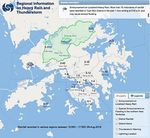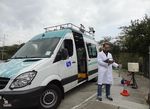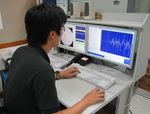HONG KONG : THE FACTS - Hong Kong Observatory
←
→
Page content transcription
If your browser does not render page correctly, please read the page content below
HONG KONG : THE FACTS
Hong Kong Observatory
The Hong Kong Observatory is a government department for providing real-time weather photos and visibility readings, a
responsible for monitoring and forecasting weather, as well as lightning location network for detecting lightning and two Doppler
issuing warnings on weather-related hazards. The Observatory weather radars for detecting the intensity and movement of rain
also monitors and assesses radiation levels in Hong Kong, and areas. The Observatory’s upper air measurement, automatic
provides other meteorological and geophysical services to meet wind and temperature measurement services are certified to the
the needs of the public, special users, the shipping and aviation standard of the International Organization for Standardization ISO
communities. The Observatory’s vision is to be a model of 9001:2015 Quality Management Systems. The Observatory also
excellence in protecting lives and building together a better society exchanges real-time data with other meteorological centres
through science. Service development is based on the core worldwide and receives cloud pictures from a variety of weather
values represented by the seven letters that make up the word satellites.
“SCIENCE”.
The Observatory uses computer models to simulate and predict the
evolution of weather systems over East Asia and the western North
Corporate video of the Pacific. The model results form the basis for forecasting the
Hong Kong weather in Hong Kong and the adjacent seas, as well as for providing
Observatory
the public with weather forecasts in fine spatial and temporal
resolution. For local weather, apart from providing weather
forecast up to 9 days ahead, the Observatory also operates
“Automatic Regional Weather Forecast” webpage to provide hourly
weather forecast generated by computer models for various locations
in Hong Kong and the Pearl River Delta region up to 9 days ahead,
along with Extended Outlook products that provide the probabilities
of daily minimum and maximum temperature and mean sea level
pressure in the next 14 days and tropical cyclone tracks in the coming
9 days. The “Regional Information on Heavy Rain and Thunderstorm”
webpage provides the affected regions mentioned in
“Announcement on Localised Heavy Rain”, “Special Announcement
Weather Services: The Observatory provides weather services to on Flooding in the northern New Territories” or “Thunderstorm
Warning”, as well as the recorded regional rainfall and lightning
the public, fishermen, shipping community, the aviation sector, as
locations. The Location-specific Lightning Alert Webpage (LLAW)
well as other special users. Through special arrangements, it also
also displays lightning and relevant information through a one-stop
provides tailored meteorological support for major activities such as
Geographical Information System. The “Earth Weather” webpage
fireworks display and sporting events. The Observatory is certified
provides an interactive display of computer forecast model products,
to the International Organization for Standardization ISO 9001:2015
allowing members of the public to easily appreciate the large-scale
Quality Management Systems for its public weather forecasting and
weather changes in the Asia-Pacific region.
warning services.
The Observatory staff providing round-the-clock
meteorological services
“Earth Weather” webpage
The Observatory operates a range of weather monitoring The Observatory has developed a nowcasting system called SWIRLS
equipment, including a territory-wide network of automatic
(Short-range Warning of Intense Rainstorms in Localized Systems),
weather stations for measuring wind, pressure, temperature, utilizing data from radars, rain gauges and lightning sensors, together
humidity and rainfall, a network of cameras and visibility meterswith the results of computer model simulation, to provide forecasts particular, the Observatory operates a sophisticated network of
of rainstorms and the associated inclement weather in the following weather sensors, including terminal Doppler weather radar(s),
6 hours. In addition to supporting weather forecast and warning LIDAR (LIght Detection And Ranging) systems and weather buoys, as
operations, SWIRLS also provides 2-hour rainfall and 1-hour lightning well as in-house developed meteorological systems for automatic
nowcast to the public through the Observatory’s website and the alerting of windshear, turbulence, lightning and other severe
mobile app “MyObservatory”. The Observatory was designated by weather. Extensive weather information required by the aviation
the World Meteorological Organization (WMO) as a Regional community, including flight documentation required for flights
Specialized Meteorological Centre (RSMC) for Nowcasting, providing departing from HKIA and significant convection forecast in support
of air traffic flow management, is provided through the Aviation
meteorological organisations in the Asian region with products and
Meteorological Information Dissemination System website and the
techniques related to nowcasting of high-impact weather events.
electronic flight bag mobile weather application “MyFlightWx”.
AMO also provides weather briefing services to air traffic controllers
regularly, which will be extended to other aviation users as well in
inclement weather situations. The Observatory also serves as the
Backup Asian Aviation Meteorological Centre (AAMC) to provide en-
route hazardous weather information of the region and improve
aviation safety and efficiency.
The Observatory provides marine meteorological services to
international shipping, fishing and oil drilling activities in coastal
waters as well as water sports activities offshore. Under the
“Voluntary Observing Ship Scheme” of the World Meteorological
Organization, the Observatory operates a fleet of locally based
voluntary weather observing ships to collect weather observations at
seas for meteorological organizations worldwide. The Observatory
also collaborated with shipping community to deploy drifting buoys
in the South China Sea and western North Pacific to strengthen
marine meteorological observation.
Radiation Monitoring and Assessment: The Observatory
monitors the ambient radiation levels in Hong Kong and conducts
“Regional Information on Heavy Rain and Thunderstorm” webpage
radiological measurements on samples of air, soil, water and food.
Its radiation measurement services are certified to the standard of
Weather information, forecasts and warnings on hazardous weather
the International Organization for Standardization ISO 9001:2015
for the public are delivered and broadcast through a variety of
Quality Management Systems. In the unlikely event of a nuclear
dissemination channels, including the Observatory’s website
emergency at the nuclear power stations in Guangdong, the
(https://www.hko.gov.hk and https://www.weather.gov.hk), mobile
Observatory will immediately step up radiation monitoring, assess
app “MyObservatory” on iOS and Android smartphones, Windows 10
the radiological consequences and provide technical advice to the
desktop, the 187 8200 Dial-a-weather service, press, radio, TV, as well
government regarding the appropriate protective actions to take.
as social-networking platforms such as Twitter, Weibo, YouTube,
Facebook and Instagram. The Observatory’s website is also available
with a personalized version (https://my.weather.gov.hk) to facilitate
users to customize the contents.
The Observatory provides free self-produced television weather
programmes, including a weekly educational feature named “Cool Met
Stuff”, for public broadcast on televisions, YouTube, the Observatory’s
Facebook page and the “MyObservatory” mobile app.
Observatory staff conducting radiological survey
Time Standard, Geophysical and Climatological Services:
The Observatory maintains a caesium beam atomic clock as the
Hong Kong time standard. Time checks are provided through
network time services, Internet clocks, the Dial-a-weather service
“Cool Met Stuff” programme of the and a local radio station. Meanwhile, the Observatory
Observatory contributes time information to the International Bureau of
Weights and Measures (BIPM) in France for the determination of
“MyObservatory” the Co-ordinated Universal Time (UTC).
mobile app The Observatory operates a network of seismograph stations and
The Observatory’s Airport Meteorological Office (AMO) which is ISO collects real-time data from numerous seismograph stations around
9000 certified since 2002 provides meteorological services required the world to monitor earthquake activities and to provide
by international air navigation to the Hong Kong International earthquake information services, including the dissemination of
Airport (HKIA) and for the Hong Kong Flight Information Region. In Quick Earthquake Messages through Twitter, Weibo and RSS. Italso operates a network of tide gauges to provide information on
tides, mean sea levels, storm surges and tsunamis. The
Observatory issues warnings in the unlikely event that tsunamis may
affect Hong Kong.
Observatory staff performing seismic analysis
For climate services, the Observatory operates the “Climatological
Information Services” webpage which provides the public and
users in different sectors with one-stop-shop online access to
various climate information and statistics of Hong Kong, the latest
climate news and educational resources on climate subjects. The
Observatory also actively collaborates with stakeholders and
partners to enhance the usage of climate information in different
areas, including engineering projects, town planning, water
resources management, scientific research, energy saving, public
health and disaster risk reduction.
The Observatory issues predictions of the annual rainfall and the
total number of tropical cyclones affecting Hong Kong in the year.
It also issues seasonal forecasts of temperature and rainfall of
Hong Kong via its website. The Observatory also conducts
researches on climate change impacts to Hong Kong, and through
the “Climate Change” webpage summarizes the past and projected
climate trends in the global as well as local contexts and provides
the latest updates and relevant data on climate change issues.
To promote public awareness of climate change, natural disasters,
and the Observatory’s services, outreach activities such as public
talks, seminars, courses, and exhibitions, including the Observatory
Open Day, are regularly organized. Publicity and public
educational materials, Observatory’s Blog and Weather Note are
also produced. Through the “Science in the Public Service”
campaign, the Observatory also joins forces with other
government bureaux/departments to enhance the public’s
understanding of the application of science and technology in the
provision of public services.
Hong Kong Observatory’s Open Day
©Hong Kong Special Administrative Region Government
2020You can also read


























































